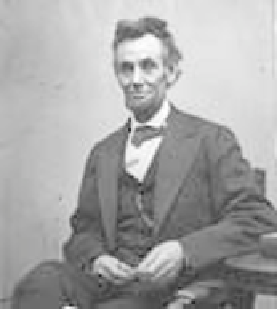Cryptography Reference
In-Depth Information
The American Civil War
Since telegraph operators would necessarily have to read the messages they
were sending, the original sender would often want to encipher it. Then the
telegraph operator would send the cryptogram in Morse Code. During the Civil
War, the U.S. Military Telegraph Corps used
route ciphers
, meaning words
transposed with codes they called
arbitraries
thrown in to confuse cryptanalysts.
They would often use
nulls
, nonsense words, to thwart cryptanalysis. President
Abraham Lincoln (see Figure 2.7) had young cipher operators in their early
twenties who were adept at cryptanalyzing Confederate correspondence. Some
Confederate commanders used a form of Vigenere cipher, but they used it badly.
In fact, some oQcers were given the choice of cipher, and it is known that
Confederate General Albert S. Johnson decided to use a Caesar cipher on one
occasion!
Lincoln's cryptanalysts had no trou-
ble in deciphering the messages, but the
same could not be said of the Confed-
erates. Sometimes they made such bad
use of their own ciphers, the recipients
could not decipher them, nor could they
even come close to decrypting the Union
correspondence. Lincoln's assassin, John
Wilkes Booth, was known to have used
a Vigenere cipher, which was actually in-
troduced at his trial. Although no con-
nection could be made between Booth,
his associates on trial with him, and the
cipher, they were all put to death. Even
at the end of the war, roughly two weeks
after General Lee surrendered, a Vigenere
cipher was used by Jefferson Davis and
the key he used was
COME RETRIBU-
TION
to send the incredibly defiant mes-
sage
active operations to be resumed in
forty-eight hours
.
We close this section with an interest-
ing anecdote of a noncryptographic na-
ture about Booth. On April 15, 1865,
Dr. Samuel A. Mudd treated Booth's broken leg early on the morning after the
assassination. He also provided a place for Booth to rest. Mudd was arrested,
found guilty of aiding and abetting the assassins, and sentenced to life in prison
at Fort Jefferson in the Dry Tortugas. Four years after he went to prison, Pres-
ident Andrew Johnson pardoned him and he was released. However, to this
day, his name has gone down in ignominy. The standard modern-day phrase,
“Your name is Mudd”, means that a person's actions have made him
persona
non grata
, Latin for an
unacceptable
or
unwelcome person
.
Figure 2.7: Abraham Lincoln.
Courtesy of the Library of
Congress, reproduction no.
LC-USZ61-1938, Pictures and
Photographs Division. It was
the last sitting, four days
before Lincoln's assassination.





Search WWH ::

Custom Search